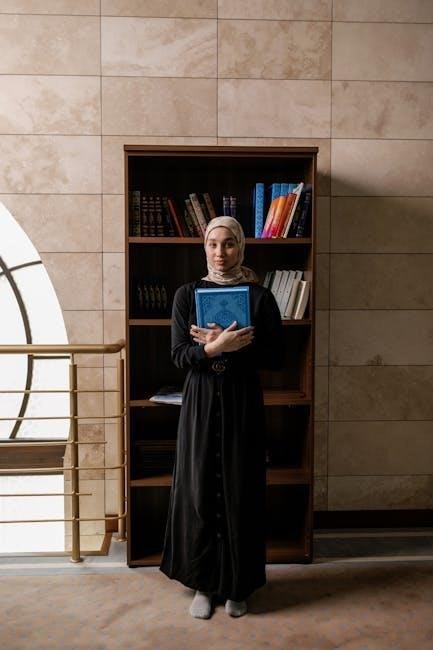Overview of Learning Arabic in Saudi Arabia
Learning Arabic in Saudi Arabia offers cultural insights and career opportunities. The FSI Saudi Arabian Arabic Course and Saudi Electronic University’s Arabic Online program provide comprehensive resources for learners.
1.1 Importance of Arabic Language in Saudi Arabia
The Arabic language holds profound cultural, religious, and historical significance in Saudi Arabia. As the liturgical language of Islam, it is central to Islamic heritage and daily life. Mastery of Arabic facilitates deeper engagement with Saudi culture, enhances communication, and fosters mutual understanding in both personal and professional contexts.
1.2 Benefits of Learning Arabic for Expats and Students

Expats and students gain significant advantages by learning Arabic in Saudi Arabia. It enhances career opportunities, improves cultural integration, and facilitates daily interactions. Arabic proficiency also opens doors to understanding Islamic texts and appreciating local traditions, making it a valuable skill for both personal and professional growth in the Kingdom.
Saudi Arabian Dialects and Their Significance
Saudi Arabia boasts diverse dialects, each reflecting regional culture and history. Understanding these dialects enhances communication and cultural identity, making them vital for learners of Arabic in the Kingdom.
The Hijazi dialect, prevalent in western Saudi Arabia, is known for its melodic tone and unique vocabulary. Spoken in urban areas like Jeddah and Mecca, it reflects the region’s cultural richness. Resources like the FSI Saudi Arabian Arabic Course emphasize its importance, offering insights for learners seeking to master this dialect and connect with its vibrant heritage.
2.2 Differences Between Standard Arabic and Saudi Dialects
Standard Arabic, the formal written language, differs from Saudi dialects in vocabulary, pronunciation, and grammar. The Hijazi dialect, for instance, features softer tones and unique expressions. While Standard Arabic is used in media and education, dialects like Hijazi are prevalent in daily life, highlighting the importance of understanding both for effective communication in Saudi Arabia.
Popular Resources for Learning Saudi Arabic
Popular resources include the FSI Saudi Arabian Arabic Course, “A Guide for Non-native Learners of Arabic,” and online platforms offering PDF materials for dialect-specific learning.
3.1 FSI Saudi Arabian Arabic Course
The FSI Saudi Arabian Arabic Course, developed by Dr. Margaret K. Omar, focuses on the Hijazi dialect. It includes 305 pages of comprehensive language material, Arabic passages, and grammatical notes. Hosted by Live Lingua, it provides a structured approach to learning Saudi Arabic, ideal for self-paced learners seeking cultural and linguistic proficiency.
3.2 “A Guide for Non-native Learners of Arabic” Book
This translated English version aids non-native speakers in mastering Arabic. It combines standard Arabic with dialect variations, preparing learners for diverse regional pronunciations. The guide emphasizes practical methods, offering valuable strategies for both students and educators, making it a key resource for understanding and teaching the language effectively in Saudi Arabia and beyond.
3.3 Online Platforms and PDF Materials
Online platforms like LearnArabicOnline.com offer comprehensive PDF materials for Saudi Arabic learners. These resources include crash courses, dialect-specific guides, and cultural insights. Websites host free manuals and courses, such as the FSI Saudi Arabian Arabic Course, providing accessible and structured learning opportunities for expats and students aiming to master the language effectively.

Cultural Aspects of Learning Arabic in Saudi Arabia
Learning Arabic in Saudi Arabia deeply connects learners to the region’s rich cultural heritage and Islamic traditions, emphasizing the language’s role in faith and daily life.
4.1 Cultural Immersion and Language Acquisition
Cultural immersion in Saudi Arabia enhances Arabic learning by engaging with native speakers and traditions. The FSI Saudi Arabian Arabic Course and Saudi Electronic University’s Arabic Online program provide resources that align language acquisition with cultural understanding, emphasizing dialects, customs, and Islamic heritage. This integration fosters deeper connections to the language and its cultural context.
4.2 Role of Islamic Heritage in Arabic Learning
The Prophet Muhammad (PBUH) emphasized learning Arabic for Islamic obligations and rites, making it integral to religious practices. Islamic heritage deeply connects with the Arabic language, as the Quran and Hadiths are written in Arabic. This duality enriches the learning experience, fostering a spiritual and cultural appreciation of the language in Saudi Arabia and beyond.

Educational Initiatives in Saudi Arabia
Saudi Arabia has launched innovative programs like the Saudi Electronic University’s Arabic Online and King Abdullah University’s AI-based learning systems to modernize Arabic education and accessibility.
5.1 Saudi Electronic University’s Arabic Online Program

The Saudi Electronic University launched its Arabic Online program in 2015, offering a comprehensive, interactive e-learning platform. It provides structured lessons in standard Arabic, with regional dialect elements, making it accessible to learners worldwide. The program emphasizes cultural immersion and practical communication skills, catering to both expats and students seeking to master Arabic efficiently.
5.2 King Abdullah University’s AI-Based Arabic Learning System
King Abdullah University collaborated with Chinese universities to develop an AI-based Arabic learning system. This innovative platform focuses on enhancing Arabic language acquisition through advanced technology. It offers personalized learning paths, speech recognition, and interactive exercises, making it a cutting-edge tool for learners seeking to master Arabic effectively in a modern, tech-driven environment.
Textbooks and Study Materials
Popular textbooks like “I Love Arabic” and “Learn Arabic” series provide structured learning. Spoken Saudi Arabic Course Manuals offer practical dialect-focused lessons, aiding learners in mastering both written and spoken Arabic effectively.
6.1 “I Love Arabic” and “Learn Arabic” Series
The “I Love Arabic” series, comprising four volumes, and the “Learn Arabic” series, with two volumes, are renowned for their structured approach. These textbooks, designed for non-native learners, cover grammar, vocabulary, and cultural insights. Published by the Arab Bureau for Education and Islamic endowment, they offer comprehensive lessons, making them essential resources for mastering Arabic in Saudi Arabia and beyond.
6.2 Spoken Saudi Arabic Course Manuals
Spoken Saudi Arabic course manuals are tailored for practical communication. The 305-page manual focuses on conversational skills, cultural nuances, and everyday expressions. Structured into levels, it includes dialogues, pronunciation guides, and exercises. Designed for expats and professionals, these resources bridge the gap between classroom learning and real-world application, ensuring learners master the dialect effectively while understanding local customs and traditions in Saudi Arabia.

Technology and Modern Learning Methods
Saudi Arabia’s e-learning trends are growing rapidly, driven by AI-based systems and gamification. These tools modernize Arabic education, making it accessible and engaging for global learners.
7.1 E-Learning Trends in Saudi Arabia
E-learning in Saudi Arabia is rapidly expanding, driven by government initiatives and technological advancements. The Saudi Electronic University’s Arabic Online program and King Abdullah University’s AI-based learning systems are pioneers in this field. These platforms provide interactive and accessible Arabic learning experiences, catering to both local and global learners, and fostering a culture of digital education.
7.2 Gamification and Mobile Learning in Arabic Education
Gamification and mobile learning are transforming Arabic education in Saudi Arabia. Interactive apps and platforms incorporate points, badges, and competitions to engage learners. Mobile apps like “Learn Arabic Online” offer flexible, self-paced study options. These tools, supported by Saudi universities and tech companies, make Arabic learning accessible and enjoyable, aligning with the Kingdom’s digital education goals.
Challenges in Learning Arabic
Mastering Arabic script and pronunciation is difficult for many learners. Limited dialect-specific resources and variations in regional accents add to the challenges of acquiring Saudi Arabic effectively.

8.1 Difficulties in Mastering Arabic Script and Pronunciation
Arabic script presents unique challenges, such as cursive writing and unfamiliar letter shapes. Pronunciation is also tricky due to guttural sounds and regional accents. Learners often struggle with dialect variations, which differ significantly from Standard Arabic. The lack of dialect-specific resources exacerbates these challenges, making it harder for non-native speakers to achieve fluency in Saudi Arabic;
8.2 Limited Availability of Dialect-Specific Resources

Learners often face challenges due to limited dialect-specific resources. While materials for Modern Standard Arabic are abundant, regional dialects like Hijazi are less represented. This scarcity makes it difficult for learners to adapt to local communication needs, hindering effective language acquisition in Saudi Arabia.

Success Stories and Motivation
Inspiring tales of expats and students mastering Arabic in Saudi Arabia highlight the rewards of cultural connection and career opportunities, motivating others to embrace the language journey.
9.1 Inspiring Stories of Non-Native Arabic Learners
Non-native learners, like expats and students, share inspiring journeys of mastering Arabic in Saudi Arabia. One professional utilized the FSI Saudi Arabian Arabic Course to enhance career opportunities, while another benefited from the Saudi Electronic University’s Arabic Online program. These success stories highlight the transformative impact of learning Arabic, fostering cultural connections and personal growth in the Kingdom.
9.2 Tips for Effective Arabic Language Acquisition
Engage with native speakers, practice consistently, and immerse yourself in Arabic media. Utilize resources like FSI courses and “A Guide for Non-native Learners.” Start with basics like script and pronunciation, then gradually explore dialects. Leverage online platforms and interactive tools for modern learning. Regular practice and cultural immersion are key to mastering Arabic effectively in Saudi Arabia.
Saudi Arabia’s initiatives, like e-learning and AI-based systems, highlight Arabic’s growing global importance. The kingdom’s vision promotes Arabic learning, ensuring its relevance in future communication and cultural exchange.
10.1 The Growing Importance of Arabic in Global Communication
Arabic’s role in global communication is expanding, driven by Saudi Arabia’s e-learning initiatives and AI-based systems. As the world engages more with Arabic-speaking regions, demand for Arabic skills grows, fostering cultural exchange, diplomacy, and business. Saudi Arabia’s vision to promote Arabic ensures its relevance in shaping future global interactions and technological advancements.
10.2 Saudi Arabia’s Vision for Promoting Arabic Language
Saudi Arabia aims to elevate Arabic’s global status through innovative education and technology. Initiatives like the Saudi Electronic University’s Arabic Online program and King Abdullah University’s AI-based learning tools exemplify this vision. By integrating Arabic into digital platforms, Saudi Arabia seeks to make the language accessible worldwide, ensuring its preservation and growth in modern communication.
